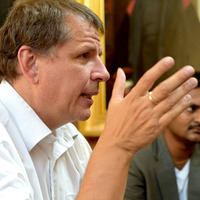
Alf Nilsen
Professor
less
Related Authors
Sheilagh Ogilvie
University of Oxford
Josiah Heyman
University of Texas at El Paso (UTEP)
Dominik Wujastyk
University of Alberta
Will Sweetman
University of Otago
Alejandra B Osorio
Wellesley College
Robert Knox
University of Liverpool
David Seamon
Kansas State University
Remo Caponi
University of Cologne
James Mallinson
University of Oxford
Philipp A Maas
Leipzig University (Universität Leipzig)
InterestsView All (45)










Uploads
Books by Alf Nilsen
More than 70 years after its founding, with Narendra Modi's authoritarian Hindu nationalists in government, is the dream of Indian democracy still alive and well?
India's pluralism has always posed a formidable challenge to its democracy, with many believing that a clash of identities based on region, language, caste, religion, ethnicity and tribe would bring about its demise. With the meteoric rise to power of the Bharatiya Janata Party, its solidity is once again called into question: is Modi's Hindu majoritarianism an anti-democratic attempt to transform India into a monolithic Hindu nation from which minorities and dissidents are forcibly excluded?
With examinations of the way that class and caste power shaped the making of India's postcolonial democracy, the role of feminism, the media, and the public sphere in sustaining and challenging democracy, this book interrogates the contradictions at the heart of the Indian democratic project, examining its origins, trajectories and contestations.
- A fine-grained and engaged historical ethnography of the making of subalternity and citizenship in Adivasi communities in rural India
- Develops and deploys an innovative Gramscian approach to the study of how subalternity is constituted and contested in state–society relations
- The book is written in an engaging style that will be accessible to non-specialist readers and a wide readership beyond the disciplinary confines of South Asia studies
""Marxism and Social Movements is the first sustained engagement between social movement theory and Marxist approaches to collective action. The chapters collected here, by leading figures in both fields, discuss the potential for a Marxist theory of social movements; explore the developmental processes and political tensions within movements; set the question in a long historical perspective; and analyse contemporary movements against neo-liberalism and austerity.
Exploring struggles on six continents over 150 years, this collection shows the power of Marxist analysis in relation not only to class politics, labour movements and revolutions but also anti-colonial and anti-racist struggles, community activism and environmental justice, indigenous struggles and anti-austerity protest. It sets a new agenda both for Marxist theory and for movement research."
Download flyer for 25% discount offer."
the activism of sexual subalterns in eastern India and the mobilization of artisanal fishing communities in Tamil Nadu, the
essays in this volume cover a diverse range of ongoing struggles against dispossession, disenfranchisement, and stigma that are
unfolding in neoliberal India.
The volume analyses the forms of collective agency that subaltern groups develop to negotiate with the workings of power
from above. Foregrounding the imaginative, affective, and secular dimensions of subaltern agency, New Subaltern Politics
interrogates the current relevance of Gramscian concepts of hegemony, subalternity, and the integral state in the contemporary Indian context. Bringing together path-breaking methodological and conceptual interventions in the study
of subaltern politics, this volume will be invaluable to all those engaged—as academics or as activists--in the struggle
against unjust societies and unequal developmental trajectories.
Exploring struggles on six continents over 150 years, this collection shows the power of Marxist analysis in relation not only to class politics, labour movements and revolutions but also anti-colonial and anti-racist struggles, community activism and environmental justice, indigenous struggles and anti-austerity protest. It sets a new agenda both for Marxist theory and for movement research.
The book explains the Narmada conflict and addresses how the building of the anti-dam campaign was animated by processes of collective learning, how activists extended the spatial scope of their struggle by building networks of solidarity with transnational advocacy groups, and how it is embedded in and shaped by a wider field of force of capitalist development at national and transnational scales. The analysis emphasizes how the Narmada dam project is related to national and global processes of capitalist development, and relates the Narmada Valley movement to contemporary popular struggles against dispossession in India and beyond.
Conclusions drawn from the resistance to the Narmada dams can be applied to social movements in other parts of the Global South, where people are struggling against dispossession in a context of neoliberal restructuring. As such, this book will have relevance for people with an interest in South Asian studies, Indian politics and Development Studies.
Papers by Alf Nilsen
More than 70 years after its founding, with Narendra Modi's authoritarian Hindu nationalists in government, is the dream of Indian democracy still alive and well?
India's pluralism has always posed a formidable challenge to its democracy, with many believing that a clash of identities based on region, language, caste, religion, ethnicity and tribe would bring about its demise. With the meteoric rise to power of the Bharatiya Janata Party, its solidity is once again called into question: is Modi's Hindu majoritarianism an anti-democratic attempt to transform India into a monolithic Hindu nation from which minorities and dissidents are forcibly excluded?
With examinations of the way that class and caste power shaped the making of India's postcolonial democracy, the role of feminism, the media, and the public sphere in sustaining and challenging democracy, this book interrogates the contradictions at the heart of the Indian democratic project, examining its origins, trajectories and contestations.
- A fine-grained and engaged historical ethnography of the making of subalternity and citizenship in Adivasi communities in rural India
- Develops and deploys an innovative Gramscian approach to the study of how subalternity is constituted and contested in state–society relations
- The book is written in an engaging style that will be accessible to non-specialist readers and a wide readership beyond the disciplinary confines of South Asia studies
""Marxism and Social Movements is the first sustained engagement between social movement theory and Marxist approaches to collective action. The chapters collected here, by leading figures in both fields, discuss the potential for a Marxist theory of social movements; explore the developmental processes and political tensions within movements; set the question in a long historical perspective; and analyse contemporary movements against neo-liberalism and austerity.
Exploring struggles on six continents over 150 years, this collection shows the power of Marxist analysis in relation not only to class politics, labour movements and revolutions but also anti-colonial and anti-racist struggles, community activism and environmental justice, indigenous struggles and anti-austerity protest. It sets a new agenda both for Marxist theory and for movement research."
Download flyer for 25% discount offer."
the activism of sexual subalterns in eastern India and the mobilization of artisanal fishing communities in Tamil Nadu, the
essays in this volume cover a diverse range of ongoing struggles against dispossession, disenfranchisement, and stigma that are
unfolding in neoliberal India.
The volume analyses the forms of collective agency that subaltern groups develop to negotiate with the workings of power
from above. Foregrounding the imaginative, affective, and secular dimensions of subaltern agency, New Subaltern Politics
interrogates the current relevance of Gramscian concepts of hegemony, subalternity, and the integral state in the contemporary Indian context. Bringing together path-breaking methodological and conceptual interventions in the study
of subaltern politics, this volume will be invaluable to all those engaged—as academics or as activists--in the struggle
against unjust societies and unequal developmental trajectories.
Exploring struggles on six continents over 150 years, this collection shows the power of Marxist analysis in relation not only to class politics, labour movements and revolutions but also anti-colonial and anti-racist struggles, community activism and environmental justice, indigenous struggles and anti-austerity protest. It sets a new agenda both for Marxist theory and for movement research.
The book explains the Narmada conflict and addresses how the building of the anti-dam campaign was animated by processes of collective learning, how activists extended the spatial scope of their struggle by building networks of solidarity with transnational advocacy groups, and how it is embedded in and shaped by a wider field of force of capitalist development at national and transnational scales. The analysis emphasizes how the Narmada dam project is related to national and global processes of capitalist development, and relates the Narmada Valley movement to contemporary popular struggles against dispossession in India and beyond.
Conclusions drawn from the resistance to the Narmada dams can be applied to social movements in other parts of the Global South, where people are struggling against dispossession in a context of neoliberal restructuring. As such, this book will have relevance for people with an interest in South Asian studies, Indian politics and Development Studies.
Full info here: https://www.routledge.com/The-Essential-Guide-to-Critical-Development-Studies/Veltmeyer-Bowles/p/book/9781472483485
https://global.oup.com/academic/product/the-land-question-in-india-9780198792444?q=D%27Costa&lang=en&cc=gb#
This paper explores social movements from above as the organization of multiple forms of skilled activity around a rationality expressed and organized by dominant social groups, which aims at the maintenance or modification of a dominant structure of entrenched needs and capacities in ways that reproduce and/or extend the power of those groups and its hegemonic position within a given social formation.
Starting from a theoretical conception of social structure as the sediment of struggle between social movements from above and those from below, the paper discusses the relevance of a conception of social movements from above to activist experience – in particularly as a way of avoiding the reification of exploitative and oppressive social structures.
The paper moves on to an outline of a model of the fields of force animated by movements from above and below in understanding the major ‘epochal shifts’ and ‘long waves’ in capitalist development. This model is then put to work in a prolegomenon to an analysis of global neoliberal restructuring as a social movement from above aiming to restore the class power of capital over labour.
This analysis aims to discern the hegemony of neoliberalism not as an accomplished and monolithic state of affairs, but as an unfinished process riddled by internal contradictions which the movement of movements might exploit in its efforts to impose an alternative direction and meaning upon the self-production of society.
This paper attempts to do two things. Firstly, it offers a rough-and-ready typology of how grassroots activists experience their opponents in “social movements from above”, the ways in which dominant social groups attempt to maintain or extend ways of organising human practice that sustain their power. We explore defensive and offensive movements from above, the political choices and alliances involved, and the ways in which movements from above impact on activists in movements from below.
Secondly, we attempt to theorise the collective agency of subaltern social groups, making the links between their situated experience of their lifeworld, the conflicts between “common sense” and “good sense”, and the development out of these of militant particularisms, large-scale campaigns and social movement projects aiming to restructure human practice on a large scale. We are interested in particular in how this process is experienced and shaped by activists themselves. In conclusion, we use the categories of neo-liberalism and the “movement of movements” to discuss the current shape of the conflict between movements from above and from below.
We start by outlining what is at stake and asking what "winning" means: what actually happens when a social movement project from below achieves its goal of constructing "another world"? We explore the step- by-step processes through which the movement of movements is currently developing the "insurgent architecture" involved in this construction, and noting how this presents a challenge for the powers that be.
We then turn to the massive opposition that the movement has been meeting from above - from multinational institutions, states and corporations. We explore the nature of these responses and argue that while they have failed to defeat the movement, they have brought about something of a temporary stalemate. We ask how the movement can get beyond this stalemate, not by adopting the logic and methods of its opponents, but by taking qualitative steps forward in its own development, according to its own logic.
The paper finishes with some brief discussion of the most important practical steps in constructing another world, and the nature of the moments of confrontation that lie ahead.
Please note that, as such, it is written without the usual academic references, quotes, and citations. Full references, quotes, and citations will be provided as part of a longer version of this paper, to be published as a journal article later this year.